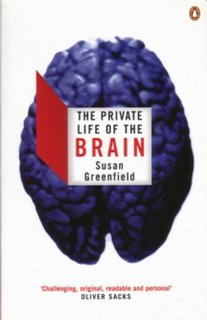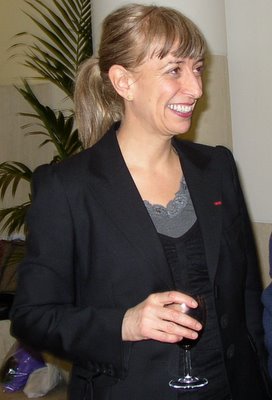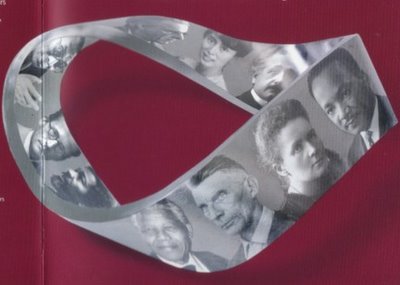
A strange thing: I spent the journey down to London writing a short story about a man who has Alzheimer's disease (having done a little research about the condition in advance), then when Baroness Greenfield was introduced discovered that Alzheimer's and Parkinson's disease were two areas of her research. Here is my interpretation of Baroness Greenfield's talk.
Huntington's Chorea is unique in that it is caused by one 'bad' gene; other brain dysfunctions are thought to have more complex causes - but all brain disorders can be affected by environment. A 'rich' environment which challenges and stimulates the brain both delays the onset of the condition and ameliorates its effects - at least in mice. This is thought to be because a 'rich' environment causes more connections between synapses e.g. London taxi drivers have more connections in their hypocampuses through acquiring 'the knowledge' (an internal map of London in the head). Furthermore, imagining doing something encourages the growth of synaptic connections just as much as physically doing something, so that imagining yourself doing finger exercises when learning to play the piano is just as good as actually doing them. This is something I have heard applied to gymnasts too - imagining how to move along the bar improves the performance just as much, or nearly as much, as actually physically doing it - something called visualisation, I think.
When we are born we have few connections between synapses. As we grow we begin to make sense of all the sensations that are bombarding us and learn to make connections. We were shown a series of diagrams showing the typical nerve cells for a baby, a child, an adult and then someone beginning to suffer from dementia and then full-blown senility. These fragile-looking things reminded me of a seedlings complete with roots and shoots. The baby's and the senile person's were remarkably similar - almost devoid of connections. Someone with Alzheimer's has their associations dismantled and they come to understand less and less. This reminded me so much of
Shakespeare's ages of man in AS YOU LIKE IT.

Baroness Greenfield concluded the first part of her talk by observing that the mind is 'the personalisation' of the brain and vulnerable to drugs and disease. She then went on to consider what might come next, how the new technologies where silicon chips may be interfaced with biological neurons (which has already started to happen) which may enable the mind to become enhanced - and what will happen to society as a result.
She also went on to consider the concept of creativity - theorising that it is necessary to
(i) be able to deconstruct (ie to be able to work within small networks like the child, to abstract sensations);
(ii) make unusual, idiosyncratic connections;
and (iii) trigger new associations and therefore see the world in a new way and so activate more extensive connections thereby triggering the 'Eureka' moment.
This all ties in with what I encountered before in
Djerassi's lecture and in the
films on creativity in the BEAUTIFUL MINDS exhibition itself - creativity comes with the opportunity and ability to make new connections and Baroness Greenfield has provided a possible rationale.
After the end of the lecture there was a very interesting question and answer session which included a consideration of what exactly is human nature and it was suggested that maybe it could be described by the seven deadly sins.
Baroness Greenfield is an accomplished speaker and performer. Her talk was delivered rapidly and very fluently with references to cartoons and jokes at her own expense - all of which made for an entertaining seventy-five minutes. This talk, I felt, was a taster (because very often I found myself wanting to know more) leading to the main course which consists of her books - THE PRIVATE LIFE OF THE BRAIN and TOMORROW'S PEOPLE: HOW 21st CENTURY TECHNOLOGY IS CHANGING THE WAY WE THINK AND FEEL. The title of the latter seems oddly poignant- as I sit here writing this blog.
The talk seems to have inspired me because this morning I woke very early with so many ideas rushing around my head I had to get up right away and get them down - which is very unusual for this owl.



















